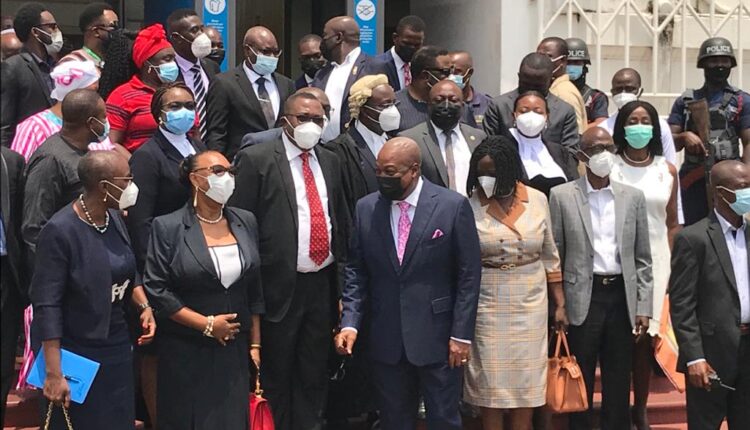Highlights of the 2020 Election Petition judgment
After 30 days of hearing and almost two hours reading the verdict, the Supreme Court has brought to rest the petition that caused sleepless nights for Justices, lawyers, journalists and the general public.
In a unanimous decision, the seven-member panel presided over by Chief Justice Anin-Yeboah on Thursday dismissed the petition filed on December 30, last year.
Among other things, the court said the petitioner, John Dramani Mahama, did not demonstrate in any way how the errors committed by the commission affected the declaration made by the EC Chairperson on December 9, 2020.
In its ruling, the apex court said the petitioner also failed to prove his case through his three witnesses (Johnson Asiedu Nketia, Dr Michael Kpessa-Whyte and Robert Joseph Rojo Mettle-Nunoo).
The Chief Justice again pointed out that it was wrong for the petitioner to hold onto the error made by the EC Chair Jean Mensa against the commission as the error was subsequently corrected.
In effect, the said errors pointed out by the petitioner was immaterial as it did not change the total valid votes cast that saw the declaration of the NPP candidate as winner of the December polls
Again, the petitioner has not been able to prove that none of the candidates got more than 50% of the total votes cast.
The Supreme Court also held that the petitioner failed to adduce enough evidence to merit a re-run between himself and the NPP presidential candidate Akufo-Addo.
Theghanareport brings you highlights of the final ruling delivered by the Chief Justice looking at the five key issues
• Issue one tackles whether or not the petition discloses any reasonable cause of action. With this, the apex court said it was not convinced that the petitioner’s team led by Tsatsu Tsikata raised a reasonable cause of action and in effect had a weak case.
• Issue two was whether or not based on the data contained in the declaration of the Electoral Commission of President Akufo-Addo as president-elect, no candidate obtained more than 50% of the valid votes cast as required by Article 63 (3) of the 1992 constitution.
In its ruling, the CJ mentioned that there is no doubt that the Chairperson of the Electoral Commission made a mistake by announcing 13,434,74 instead of 13,121,111 to be total valid votes cast but this, however, did not change the results that saw the NPP candidate winning the polls.
He pointed out that the commission after realising the mistake effected the necessary changes in a press release.
Justice Anin-Yeboah believes the error pointed out has no bearing on the matter before the court as the NPP presidential candidate Nana Akufo-Addo indeed crossed the 50 percent plus one threshold.
• Issue three sought to find out whether or not the second respondent still met Article 63(3) of the 1992 constitution threshold by the exclusion or inclusion of the Techiman South constituency presidential election results.
With this, the seven-member panel was of the view that the disputed Techiman South constituency results had already been added to the total results that saw Nana Akufo-Addo win.
The CJ added that even if those results were not added, the NPP candidate would still have crossed the 50 percent plus one vote threshold.
• Issue four tackles whether or not the declaration by the first respondent dated December 9, 2020, violated Article 63(3) of the 1992 constitution.
The apex court said that the error made by the EC Chair Jean Mensa did not affect the result and was not in violation of Article 63(3) of the 1992 Constitution.
• Issue five is whether or not the alleged vote padding and other errors complained of by the petitioner affected the outcome of the presidential election results of 2020.
The CJ said although the court finds the accusation of vote padding very serious it observed that the allegation was not proven by the petitioner John Mahama.
The panel argued that the issue of vote padding did not in any way affect the outcome of the election results.
All these issues, the apex court held that the petitioner’s team failed to address, which prevents the court from granting their request for a second election.
Reliefs sought by John Mahama
(a) A declaration that Mrs. Jean Adukwei Mensa, Chairperson of the first respondent and the Returning Officer for the Presidential Elections held on December 7, 2020 was in breach of Article 63(3) of the 1992 Constitution in the declaration she made on December 9, 2020, in respect of the Presidential Election that was held on December 7, 2020
(b) A declaration that based on the data contained in the declaration made by Mrs. Jean Adukwei Mensa, Chairperson of the first respondent and the Returning Officer for the Presidential Elections held on December 7, 2020, no candidate satisfied the requirement of Article 63(3) of the 1992 Constitution to be declared President-elect
(c) A declaration that the purported declaration made on December 9, 2020 ‘of the results of the Presidential Election by Mrs. Jean Adukwei Mensa, Chairperson of first Respondent and the Returning Officer for the Presidential Elections held on December 7, 2020, is unconstitutional, null and void and of no effect whatsoever
(d) An order annulling the Declaration of President-Elect Instrument, 2020 (C.1. 135) dated December 9, 2020, issued under the hand of Mrs. Jean Adukwei Mensa, Chairperson of the first respondent and the Returning Officer for the Presidential Elections held December 7, 2020, and gazetted on December 10, 2020
(e) An order of injunction restraining the second respondent from holding himself out as President-elect
f) An order of mandatory injunction directing the first respondent to proceed to conduct a second election with Petitioner and second respondent as the candidates as required under Articles 63(4) and (5) of the 1992 Constitution



